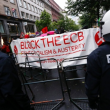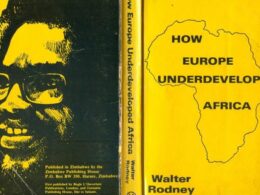By Linda Schutz
Rosa Luxemburg wrote this pamphlet in response to the outbreak of the First World War and the political collapse of German social democracy, secretly in prison one hundred years ago this year in April 1915.
In August 1914 the leadership of the SPD (Social Democratic Party- main party of working class in Germany at the time) not only voted for war credits and suspended the class struggle including no strikes, no elections or political campaigning and auto censorship of the press. They also ideologically supported it as a defence against the attack of reactionary Tsarism, the defence of the fatherland, freedom and culture, sometimes even using Marx’s words and the right of national self-determination.
A war for profit
Rosa Luxemburg shows two developments that led to the First World War: the formation of capitalist nation states that led to a race of militarisation and rivalry and the emergence of imperialism. The lack of colonies and the rapid development of German capitalism led to its challenge of British imperialism and other colonial states. This was no secret as the build-up of arms began decades before and the main objective was political power and economic expansion, for the current and especially future profits of German industry and banks.
Rosa Luxemburg called war “systematic mass murder” accompanied by “the delirium of nationalism” and “the intoxication of patriotism.” The pamphlet exposes the position of the SPD as a betrayal of the core ideas of Marxism, defending international solidarity of the working class against a common opponent.
Workers solidarity against capitalist war
Luxemburg showed that the class struggle is a result of class society and cannot be suspended, but the leadership of the German workers movement led the working class into a voluntary military dictatorship, prolonged the war and greatly endangered its own existence. She also proves that a victory of German imperialism would have been no victory for the working class because (in addition to the loss of lives, and the huge economic costs both to be paid mainly by the working class) a German victory and following hegemony would only prepare the grounds for new tensions, a new arms race and a second world war in which British Imperialism would try to win back its predominance.
Rosa Luxemburg rightly pointed out that no new program was needed, but that action was missing, and the upholding of socialist principles of international solidarity and international struggle to end capitalist exploitation, private property and class rule.
Relevance today
This pamphlet played an important role in the discussions on the socialist movement and the analysis of imperialist wars, it is also still relevant today as the underlying causes of World War I have not changed, in fact competition is fierce and inter-imperialist tensions are high.
As the United States is losing its predominant position and different regional powers are seeing their chances to increase their power and military strength. European countries have formed a block, but the EU has not overcome the differences of the ruling classes and has not led to a unified, economic, fiscal or exterior policies. Since 1945 imperialism does not use direct influence in the form of colonies but still relies on war as a method to obtain and maintain spheres of influence, to ensure access to markets and raw materials, trade routes etc.
War still exists an as institution of capitalism even more so today than 100 years ago when Rosa Luxemburg stood against the slaughter that engulfed Europe at this time. Today military spending stand at an obscene $1.2 trillion per annum and in the last decade imperialist wars have brought death, destruction and chaos to Afghanistan and Iraq.
We must fight for Rosa’s vision of a socialist world where co-operation and democratic planning of the economy can replace the anarchy of a capitalist system that has long outlived its usefulness to humanity.












